IRGC-Affiliated News Website Hacked Reportedly By Israeli Group
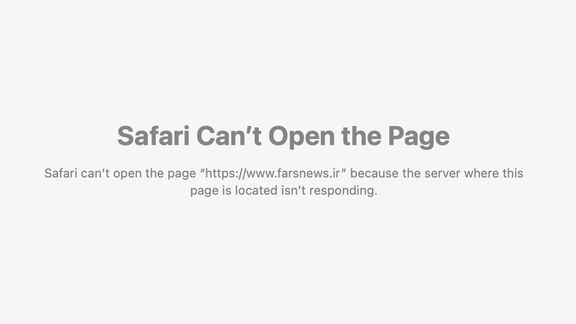
The website of Fars News Agency, a hardliner Iranian media outlet affiliated with the Revolutionary Guard, has been hacked allegedly by an Israeli group of hackers.

The website of Fars News Agency, a hardliner Iranian media outlet affiliated with the Revolutionary Guard, has been hacked allegedly by an Israeli group of hackers.
The group, named "Army of Thieves", claimed credit for the cyberattack Sunday evening.
The IRGC-affiliated webpage is still down when pinged from abroad following the denial-of-service attack (DoS attack), in which the perpetrator seeks to make a machine or network resource unavailable to its intended users by temporarily or indefinitely disrupting services of a host connected to a network.
The hacking group was responsible for other attacks on Iranian organizations, including the website of Iran’s Islamic Azad University.
In June, Israel said an IRGC cyber unit called “Shahid Kaveh” conducted research to damage ships, gas stations and industrial plants in several countries including Britain, the US, France and Israel.
Defense minister Benny Gantz said that Israel -- which is widely believed to have waged cyber war against Iran's nuclear facilities and other infrastructure -- may retaliate physically against enemy hackers.
Iran has been repeatedly accused of cyberattacks against the West, Israel and rival Arab countries in the Middle East.
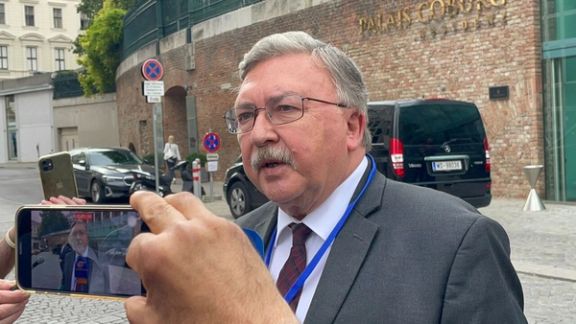
Diplomats engaged in Iran nuclear talks in Vienna sent conflicting messages on Sunday regarding possible progress to reach an agreement over reviving the 2015 deal.
While Russia’s ambassador Mikahil Ulyanov expressed optimism, the US envoy Rob Malley was quoted as voicing disappointment, and Tehran urging Washington to be flexible.
Indirect talks between Iran and the United States to save the 2015 pact resumed in Vienna on Thursday after 16 months of negotiations without reaching a deal.
During a Sunday phone call with UN Secretary General António Guterres, Iranian Foreign Minister Hossein Amir-Abdollahian said that Supreme Leader Ali Khamenei's fatwa (religious decree) on prohibition of using nuclear weapons makes it clear to everyone that nuclear arms have no place in Iran's doctrine and are against its policy and beliefs.
Other Iranian officials, however, have said that Khamenei may be requested to change his fatwa and strategy on the prohibition of producing nuclear weapons. "We will ask Supreme Leader Ali Khamenei to change his fatwa and strategy on the prohibition of producing nuclear weapons if the enemies of the Islamic Republic continue their threats," Iranian lawmaker Mohammad-Reza Sabbaghian Bafghi said on August 2.
Amir-Abdollahian also called on the UN nuclear watchdog, the IAEA to technically resolve the remaining issues regarding Iran's nuclear activities before 2003, and "distance itself from non-constructive political issues".
IAEA has discovered unexplained traces of uranium at three sites in Iran used for secret research and development prior to the discovery of the country’s nuclear program. The watchdog says that so far Tehran has not convincingly explained why there was uranium in these sites.
Amir-Abdollahian went on to repeat Iran’s public posture that the success of indirect talks between Tehran and the United States depended on flexibility from the American side. “We are serious about clenching a strong and durable agreement and the negotiations are now going on in Vienna with seriousness. Of course, the outcome of this issue depends on whether the United States wants an agreement to be reached [and] whether the US shows necessary resilience and realism in practice.”
Washington and its European allies say that they have made a reasonable offer and the onus is on Tehran to make a decision.
Also on Sunday, Russia’s chief negotiator Mikhail Ulyanov expressed hope about agreement in the Vienna talks, saying that there has been “progress” on resolving safeguards-related issues but “it has not been fully settled.”
“They are sensitive, especially for Iranians and Americans. I cannot guarantee, but the impression is that we are moving in the right direction, and the number of unresolved issues is minimal. Just three or four and some of them are almost settled… We’re talking about days, not weeks… I will not be surprised if we finish our exercise successfully very soon,” he told reporters outside Vienna’s Palais Coburg.
“We stand 5 minutes or 5 seconds from the finish line,” Ulyanov said, repeating the exact wording that he had used in February.
Enrique Mora, the European Union’s top negotiator, also said he is “absolutely” optimistic about the talks’ progress so far. “We are advancing, and I expect we will close the negotiations soon,” he added.
According to Iran International’s correspondent Ahmad Samadi at the venue of the talks in Vienna, US Special Envoy for Iran, Robert Malley, has reportedly told one of the participating diplomats at the talks that he is not hopeful about this round of the negotiations. Malley, however, has not made any comments to reporters during the ongoing round.
"Unlike what certain Western media reported, none of the previous outstanding issues of Vienna Talks has been removed from Iran delegation's agenda, and the ideas presented by Iranian officials have been raised in the talks," said Nour News, a website affiliated with the secretary of Iran's Supreme National Security Council (SNSC), Ali Shamkhani.
An adviser to Iran’s nuclear negotiating team said on Saturday, August 6, that some progress was made in Vienna, but issues remain and chances for an agreement is 50-50. Mohammad Marandi told the Arabic Al Mayadeen television, “I don’t know if we will reach an agreement, but the chance is 50 percent.” He stressed that the remaining issues are between Iran and the United States and “there are no differences with Europe or Russia.”
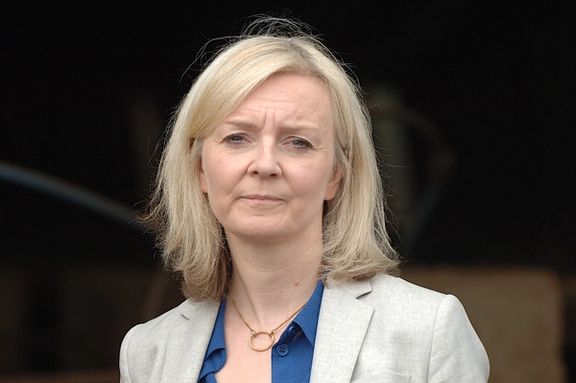
UK Foreign Secretary Liz Truss has said that she remains committed to standing up to Iranian hostility and their pursuit of nuclear weapons.
Truss, who is a candidate to becomes the next UK prime minister at next month’s Conservative Party leadership election, made the remarks in a letter to Conservative Friends of Israel parliamentary group, adding that “I have been clear that progress on the Joint Comprehensive Plan of Action is not moving fast enough and I assure you that if the JCPOA collapses, all options are on the table.”
Truss also Israel’s launch of Operation Breaking Dawn on targets of Iran-backed Islamic Jihad militant outfit in Gaza, with the Foreign Office saying, "The UK stands by Israel and its right to defend itself. We condemn terrorist groups firing at civilians and violence which has resulted in casualties on both sides. We call for a swift end to the violence."
The other Conservative candidate, Rishi Sunak, wrote in his letter to the pro-Israel group that he would seek “a new, strengthened nuclear deal that extends the sunset clauses, lengthens the breakout period and curtails Iran’s ballistic missile program. The credible threat of snapback sanctions, which has so far been missing from the negotiations, is the only way we can force Iran to seriously engage with these proposals.”
He added, “Iran’s quest for regional hegemony and the threat it poses to Israel concerns me deeply. We cannot allow Iran to possess a nuclear weapon and the UK and Israel must enhance our diplomatic, defense and intelligence cooperation to prevent this from happening.”
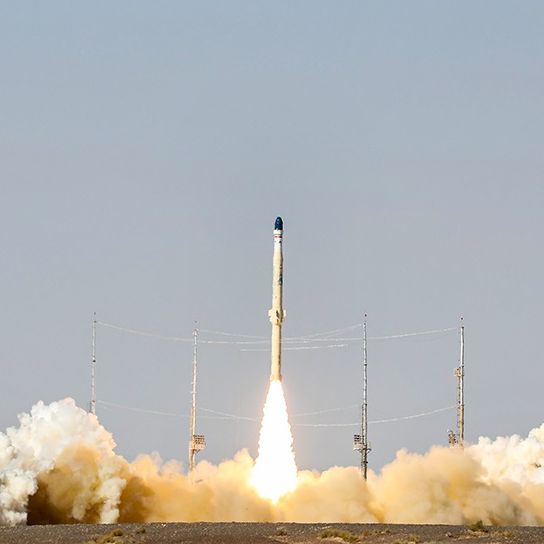
Iran has dismissed media reports that Russia intends to use the Iranian satellite Khayyam to assist the invasion of Ukraine before giving its control to the Islamic Republic.
The public relations office of Iran's Space Agency said Sunday the satellite will be fully operated and controlled by the Islamic Republic from inside Iran once launched into space by Russia.
It said that all the operations of the satellite, dubbed “Khayyam” after a 12th-century Persian polymath, will be controlled by Iranian engineers and researchers from a space base belonging to the Ministry of Information and Communications Technology immediately after reaching the orbit, adding that data management stations of the satellite are also in Iran.
Emphasizing that the satellite has no military function, the agency added that sending commands and receiving information from this satellite is done according to the encrypted algorithms that have already been embedded in it, and no third country has access to this information.
The agency made the remarks in reaction to a report by The Washington Post that quoted two Western security officials as saying that Moscow intends to use the satellite that it will launch on Iran's behalf for its own war effort in Ukraine before relinquishing its control to Tehran. They also said the satellite will greatly enhance Tehran’s ability to spy on military targets across the Middle East, including near-continuous monitoring of sensitive facilities in Israel and across the Persian Gulf.
Russia's Roscosmos space agency announced August 9 as the launch date of the satellite by a Russian Soyuz rocket from the Baikonur space station in Kazakhstan.

Iran’s Revolutionary Guard “very strongly condemn” Israel’s attacks in Gaza and vow full support to “Palestinian resistance”, the IRGC said in a statement Sunday.
Iran’s reactions to the latest flareup of violence between Israel and the Iran-backed Islamic Jihad militant group has so far been relatively low-key, as Tehran’s diplomats in Vienna are engaged in intense talks with the United States and Europe over reviving the 2015 nuclear agreement, the JCPOA.
Iran’s ruler Supreme Leader Ali Khamenei has yet to condemn Israel and threaten revenge, as some IRGC commanders have already done, and as he has done on past occasions.
The IRGC statement called Israel’s decision to launch attacks against the Islamic Jihad on Friday “a miscalculation” and a test to gauge the military prowess of the Palestinians in case of an all-out war. The statement went on to say that Israel and its supporters “will regret” the attacks on Gaza.
The Revolutionary Guard also condemned the United States and some Europeans and those Arab states which maintain “normal ties” with “the murderous Zionist regime.”
The Islamic Republic has been a full supporter of Islamic Jihad, although its relations with the other militant group in Gaza, the Hamas had had its ups and downs over the years.
The statement in the end called for the “liberation of al-Quds (Jerusalem) and the sacred land of Palestine.” It also called for the removal of “the cancerous tumor, Israel” from the world map.
Another unusual sign that Tehran might not be inclined to escalate its rhetoric against Israel was a meeting of foreign minister Hossein Amir-Abdollahian with agroup of parliamentarians on Sunday to answer questions on foreign relations.
In a report about the meeting in the government’s official news website IRNA there was no mention of the conflict in Gaza, while lawmakers asked questions on a series of less significant issues.
Equally notable was the absence of any discussion over the nuclear talks currently taking place in Vienna, while many Iranian members of parliament have repeatedly demanded explanations from the government over the fate of the negotiations.
Western and regional opponents of reviving the JCPOA argue that Iran’s ultimate aim is the destruction of Israel and an agreement that would eventually allow Tehran to legally obtain nuclear weapons while removing sanctions is dangerous.
Former US president Donald Trump left the JCPOA in 2018 arguing that the 2015 deal was a weak one and Iran also pursued aggressive policies in the region and supported “terrorism”.
But President Joe Biden disagreed with Trump’s decision and has vowed to restore that agreement, although after 16 months of multilateral talks a new agreement still remains elusive.
American and European diplomats returned to Vienna Thursday for a new round of talks with Iran although since last December they have been saying that time is running out if Iran fails to take an offer they have made.
If the current negotiations in Vienna succeed, Iran stands to gain tens of billions of dollars in the next couple of year by higher oil exports, access to frozen funds and more trade.
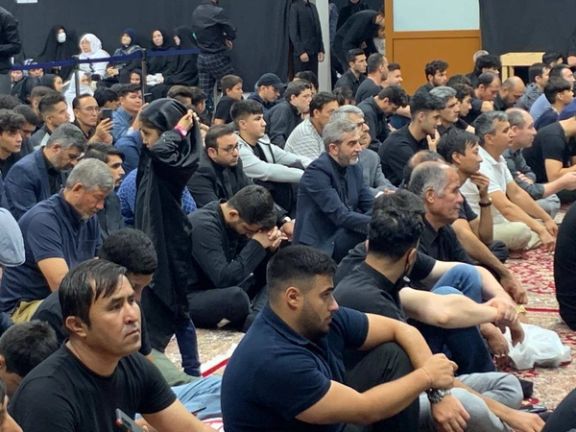
Members of Iran’s negotiating team who are in the Austrian capital for a last-ditch efforts to revive the 2015 nuclear deal have attended a Shiite religious mourning ceremony in Vienna.
The twitter account of the Islamic Republic’s embassy in Austria published photos of Tehran’s lead negotiator Ali Bagheri-Kani at the mourning ceremonies of the Islamic month of Muharram. The event was held at Vienna’s Islamic center of Imam Ali, a Shiite mosque.
The highlight of the month-long ceremonies of Muharram are the Days of Tasu'a and Ashura, the anniversary of the slaying of Shiite Imam Hussein and his 72 companions by his rivals to the leadership of Muslims. Ceremonies have been held for centuries in Iran and among Shiites in other countries, marking the event in the 680 AD battle of Karbala, in present-day Iraq, and have gained greater state support since the 1979 Islamic Revolution.
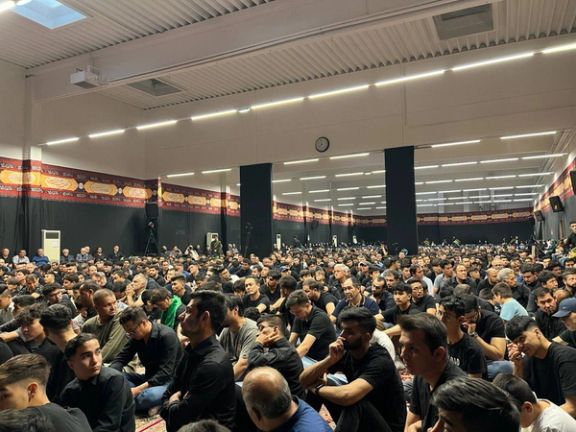
This round of the Vienna talks reportedly focus on a text circulated in late July by Josep Borrell, the European Union foreign policy chief, to bridge gaps between the United States and Iran over how the Joint Comprehensive Plan of Action -- or JCPOA -- can be revived. It is unclear how specific are proposals in Borrell’s text and how far he outlines a process.
European officials have presented a tough face to reporters gathered outside the Palais Coburg hotel in Vienna, insisting that the current talks will not be “reopening” negotiations, and urging Tehran not to make “unrealistic demands.”